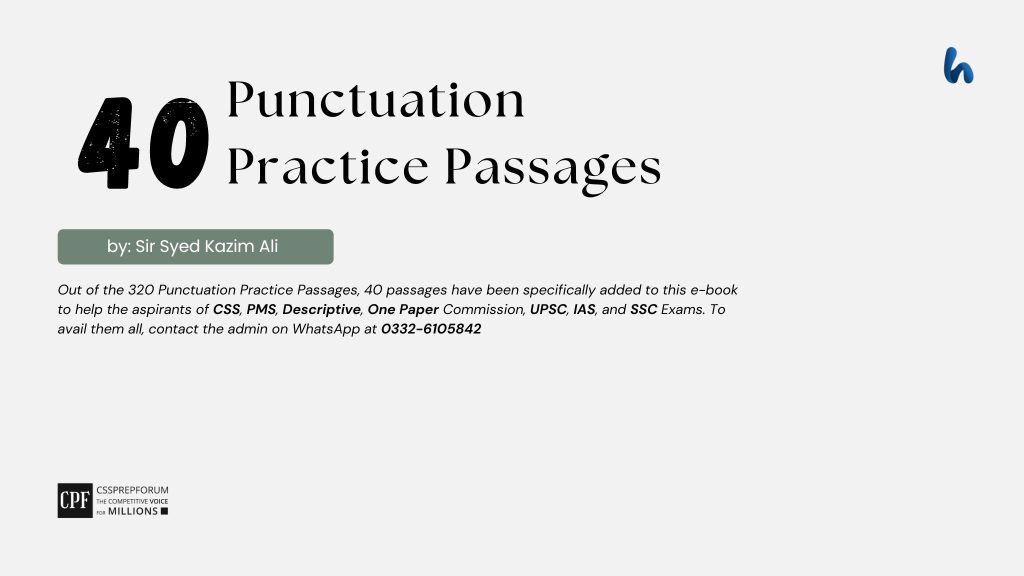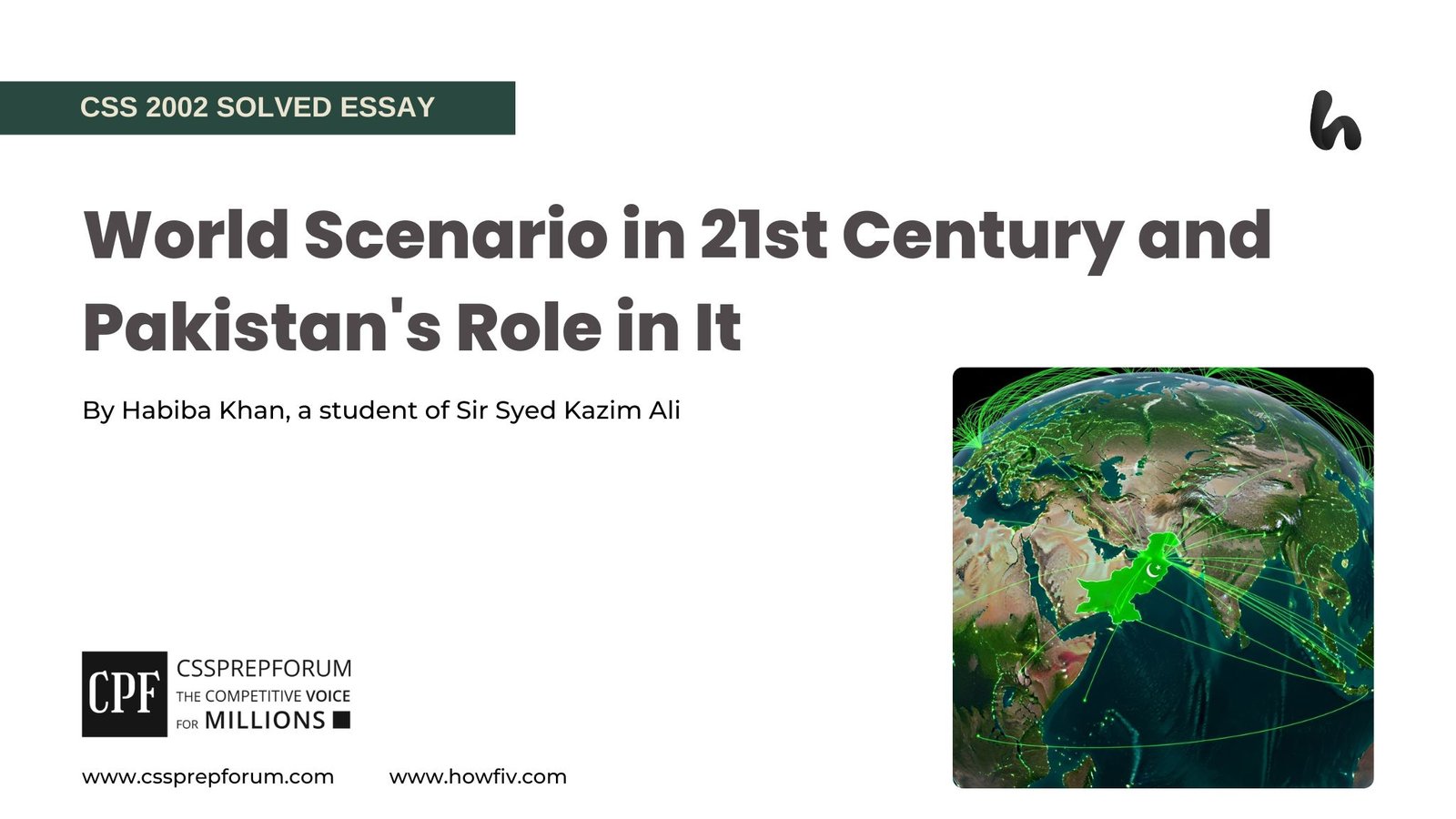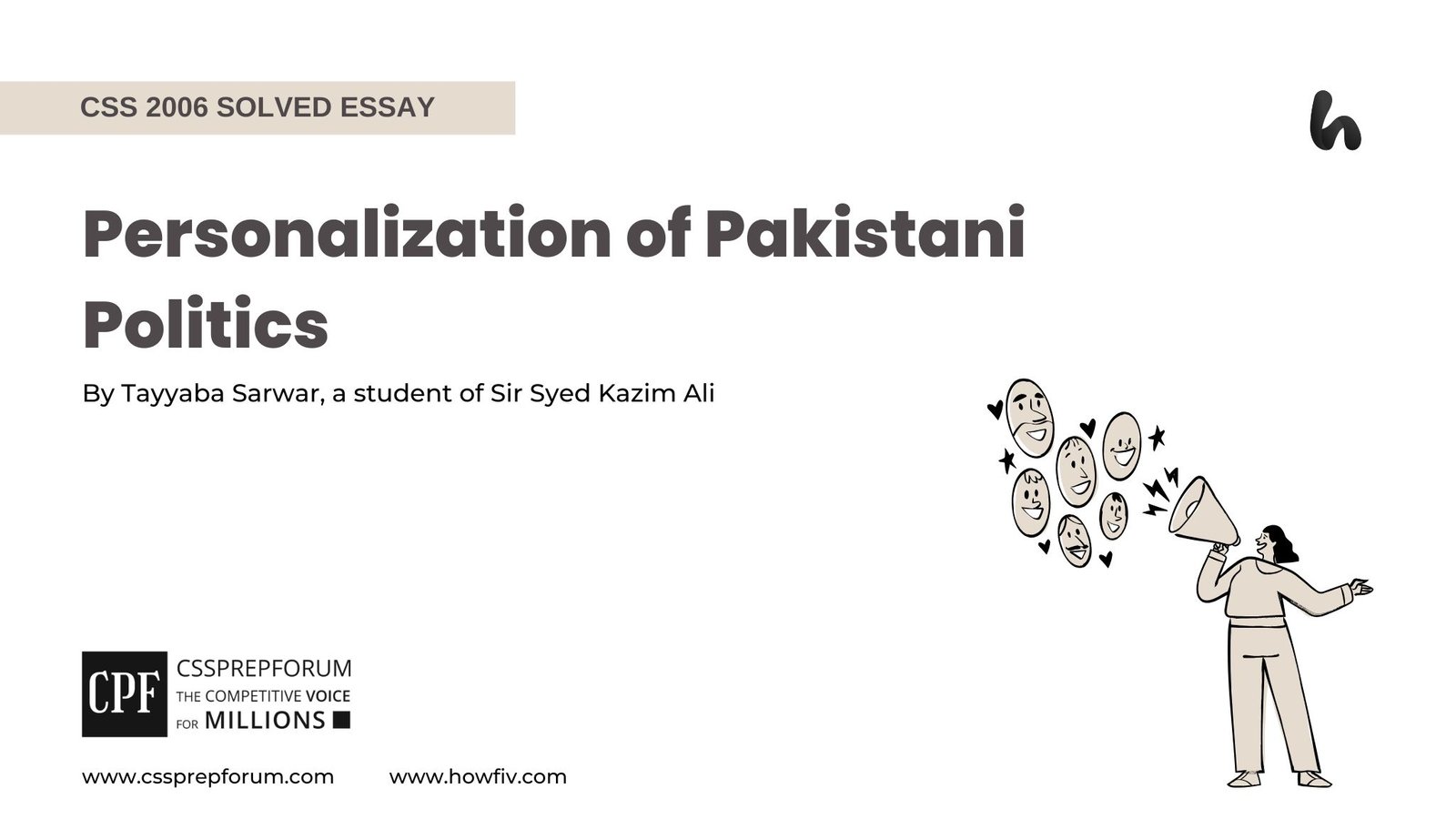Sample Argumentative Essay | Pakistan’s Overall Success Lies in Education
Important Note
The sample essay is uploaded to guide my students in understanding the structure and nuances of writing an essay, particularly for competitive exams like CSS and PMS. This example lets you grasp the essential components of a well-crafted essay, including the outline, introduction, body paragraphs, critical analysis, and conclusion. So, it would help if you noticed how the outline is formulated to ensure coherence and logical flow throughout the essay. The introduction sets the tone by clearly stating the thesis, while the supporting body paragraphs provide evidence and arguments that build on this thesis. The critical analysis, which is key to standing out in competitive exams, evaluates different perspectives on the topic. Finally, the conclusion reinforces the main points, leaving a lasting impact on the reader. Study this sample essay thoroughly, as it reflects the standards I expect from you in your own writing.

Pakistan’s Overall Success Lies in Education
Outline
Introduction
Although education is considered an essential element of national development, in reality, it alone cannot guarantee Pakistan’s overall success; instead, the success of the state depends on multiple factors like good governance, economic development, and political stability that work in synergy with education to ensure the country’s overall progress.
The significance of a multidimensional approach for the progress of a modern nation-state
What are the factors besides education upon which the success of Pakistan depends?
- ✓Good governance
- Case in point: According to research published by the Pakistan Bi-annual Research Journal, fostering a strong nation-hood and ensuring the socio-economic development of Pakistan depending heavily on good governance
- ✓Economic development
- Case in point: According to the World Bank Blogs, economic development presenting Pakistan with a chance to deal with the deep-rooted challenges hampering the country’s success for far too long
- ✓Political stability
- Case in point: According to Dr. Zahid Anwar, a Pakistani political analyst, all political parties and national institutions prioritising political stability being important because of its close link with the social and economic progress of the country
On what basis do the opponents argue that education alone can determine the success of Pakistan
- ✓Counter argument: The success of Pakistan lies solely in education because it polishes the cognitive abilities of the citizens and produces efficient human resources that are significant for the country’s progress.
- ✓Refutation: While education is an essential determinant of a country’s progress, the complicated challenges hindering Pakistan’s success cannot be countered through education alone. Factors that improve the socio-political and economic landscape of the state are just as important.
- ✓Evidence: China becoming the most successful country in the world by propelling itself out of a grave economic crisis through political, economic, social, educational, and agricultural reforms
Conclusion

Introducation-1
A country’s success is a complex, multi-dimensional process in which diverse elements collectively drive progress across multiple fronts. China serves as a prominent example of a nation achieving remarkable growth by advancing various sectors in tandem. Likewise, in Pakistan, national success is contingent upon the interplay of several critical factors. For example, effective governance upholds the rule of law and ensures justice, both of which are fundamental to societal stability. Additionally, economic development spurs trade, fosters innovation and generates employment, enhancing Pakistan’s national and international standing. Besides, political stability also remains crucial, as it strengthens democratic institutions and political will, facilitating the fulfilment of essential developmental goals. Therefore, while education plays a vital role in shaping Pakistan’s progress by enhancing cognitive abilities and producing skilled human resources, it is only one of the essential factors for the nation’s overall success. However, some critics argue that Pakistan’s success rests solely on education, asserting that it equips individuals with the skills and knowledge needed for national advancement. Yet, while education is undeniably critical, it cannot single-handedly address the multifaceted challenges impeding Pakistan’s progress. Without synergy among education, governance, economic growth, and political stability, sustainable success remains elusive for the Islamic Republic of Pakistan.
Introduction-2
A nation’s success is a complex, multidimensional process driven by the collective advancement of diverse elements across various domains. China exemplifies a nation achieving impressive growth by simultaneously fostering multiple sectors. Similarly, in Pakistan, national success depends on the integrated impact of several key factors. Effective governance, for instance, upholds the rule of law and ensures justice, both of which are foundational to societal stability. Furthermore, economic development promotes trade, stimulates innovation, and generates employment opportunities, thereby enhancing Pakistan’s national and global stature. Political stability is equally essential, as it fortifies democratic institutions and political will, enabling the pursuit of critical developmental objectives. Consequently, while education is vital to Pakistan’s progress by enhancing cognitive skills and cultivating a capable workforce, it remains only one of many critical elements required for national success. Some critics argue, however, that Pakistan’s advancement hinges solely on education, contending that it equips individuals with essential skills and knowledge. Yet, although education is undeniably important, it alone cannot address the wide array of challenges impeding Pakistan’s progress. Without the synergistic support of governance, economic development, and political stability, sustained success remains out of reach for the Islamic Republic of Pakistan.
Introduction-3
The success of a country is a multi-dimensional phenomenon where multiple factors simultaneously play their part in ensuring progress across various fronts. China is a glaring example of a country’s success by working on different components. However, in the case of Pakistan, some critics argue that its overall success depends solely on education since it polishes the cognitive abilities of the nation and produces efficient human resources. Nevertheless, the upholders of the argument fail to realize that education alone cannot counter the challenges hampering the nation’s progress. Without synergy between education and other relevant factors, the Islamic Republic’s success remains a far-fetched dream. Therefore, the overall success of the country depends on different elements. For instance, good governance ensures the rule of law and justice in society and is an important prerequisite for the nation’s success. Other than this, economic development can facilitate trade and innovation and create employment opportunities, significantly influencing the country’s national and international growth. Additionally, political stability is imperative for the country’s progress as it leads to the prevalence of democracy and fosters a political will that is essential to fulfil all the conditions crucial for Islamabad’s success. Hence, it is essential to recognize that although quality education is a mainstay of national development, it is only one of the determinants of the overall success of Pakistan.
Introduction-4
National success is a multifaceted phenomenon driven by the simultaneous contribution of various factors across multiple domains. China stands as a prominent example, achieving remarkable progress by focusing on diverse development components. In Pakistan’s context, however, some critics contend that the country’s advancement hinges solely on education, arguing that it enhances cognitive capabilities and develops an efficient workforce. Yet, this perspective overlooks the reality that education alone cannot address the complex challenges hindering the nation’s progress. Without a synergistic approach that integrates education with other essential factors, achieving sustainable success in Pakistan remains elusive. Thus, a country’s success requires a balanced focus on multiple elements. For instance, good governance, which upholds the rule of law and ensures justice, is indispensable for fostering societal stability. Additionally, economic development stimulates trade, drives innovation, and generates employment, all of which significantly boost Pakistan’s national and international growth. Furthermore, political stability is crucial to the nation’s progress, as it bolsters democratic institutions and nurtures the required political will to fulfil Pakistan’s developmental goals. Therefore, while quality education is a cornerstone of national development, it is only one of many critical components needed to secure Pakistan’s comprehensive success.

The significance of a multidimensional approach for the progress of a modern nation-state
Before going further into the essay, it is indispensable to acknowledge that development is not a unidimensional concept. Instead, the term “development” upholds an intricate and multifaceted notion. It refers to advancing and enhancing individuals, economies, and societies. Additionally, it includes several elements relevant to different sectors, including social progress, political stability, and economic sustainability. Therefore, modern nation-states need to consider the complexities of development because it aids in identifying the underlying causes of challenges hindering their progress. Besides, it also offers the states insight into how to bring about a constructive transformation, enhancing their growth. According to the Sustainable Development Goals Fund, “Longer-term outcomes are facilitated by multidimensionality. Response continuity is more likely when it involves cross-sectoral actors and is integrated.” This signifies that the development of a country cannot be realised by working on one prerequisite in isolation. Hence, a multifaceted approach is crucial for the sustainable progress of a modern nation-state.
What are the factors besides education upon which the success of Pakistan depends?
Moving towards the factors significant for the development of Pakistan, there are a number of elements besides education that determine the nation’s overall success. For instance, the country cannot grow in true spirits without a concrete governance model. Good governance accounts for the supremacy of law, which results in the prevalence of justice in society. Other than this, it helps the country’s administration to carry out its constitutional duties in a way that upholds the ideals of transparency, accountability, efficiency, and responsiveness to civil society. According to research published by the Pakistan Bi-annual Research Journal, “Fostering a strong nation-hood and ensuring the socio-economic development of Pakistan depends heavily on good governance.” This indicates that effective governance is one of the primary factors on which Pakistan’s social, political, and economic progress relies. Thus, good governance is crucial for the overall progress of the country.
Besides good governance, economic development is another determinant of the net progress of the Islamic Republic. A strong economy can not only ensure the success of the country on the national level but also strengthen its standing in the global arena. Moreover, a thriving economy can help enhance Pakistan’s economic circumstances by boosting trade and encouraging innovation and productivity. As a result, prosperity would prevail in the country because of increased employment opportunities and a reduced poverty rate. Other than this, the country would also be independent in making foreign policy choices, resulting in strong diplomatic ties across the globe. According to the World Bank Blogs,” Economic development could present Pakistan with a chance to deal with the deep-rooted challenges that have hampered the country’s success for far too long.” This entails that economic development is vital for Pakistan to counter developmental challenges as well as to assure sustainable growth on domestic and international fronts. Therefore, economic development is key to Islamabad’s overall success.
Lastly, Pakistan’s overall development relies on the country’s political stability. A sound political environment can pave the way for national integration, the prevalence of democracy, and socio-economic and political security. Political stability is not a solo act but a collaborative effort that requires coordinated measures from all the stakeholders, including the government, civil society, and foreign allies. As Dr. Zahid Anwar, a Pakistani political analyst, states, “Political stability should be the main priority for all political parties and national institutions because it is closely linked with the social and economic progress of the country.” This signifies that political stability is not just a cornerstone for development but a call to action for all citizens to play their part in preserving the social and economic fabric of the Islamic Republic, making it one of the most significant determinants of its overall advancement.
On what basis do the opponents argue that education alone can determine the success of Pakistan
However, despite the elements discussed above, on which the progress of Pakistan relies, some critics argue that the country’s overall success lies in education. The argument’s proponents uphold that education can polish the cognitive abilities of the masses and produce efficient human resources, resulting in informed decision-making and economic boost. Nonetheless, this perspective regarding the overall development of Islamabad has several loopholes. For instance, the opponents fail to realize that education alone cannot change the country’s fate in terms of success. Even if education succeeds in producing an informed and skilled population, there would still be the need for good governance, economic development, and political stability to improve the socio-political and economic landscape of the country. Furthermore, these factors can synergize with education and play a coordinated role in making Pakistan successful. To illustrate, take the case of China, where the country propelled itself out of a severe economic crisis by reforming the political, economic, social, educational, and agricultural sectors. As a result, the country is regarded as one of the most successful countries in the world. This indicates that the development of a country cannot be achieved by working on an isolated factor. Therefore, the overall success of Pakistan lies in more than just education.
Conclusion
In conclusion, while education remains a critical pillar of national development, it cannot singularly determine Pakistan’s overall success. The nation’s progress is contingent upon a holistic approach that integrates good governance, economic development, and political stability. Each of these factors plays a crucial role in shaping the socio-economic and political landscape, ensuring that the benefits of education are fully realized and sustained. Good governance fosters justice and transparency, economic development drives prosperity and global competitiveness, and political stability ensures the continuity of policies and national cohesion. As exemplified by global success stories like China, true national development is achieved through the synergistic interaction of these elements. Education, in this context, acts as a catalyst, accelerating the impact of these factors rather than being the sole driver. Thus, for Pakistan to achieve sustainable success, it must adopt a multifaceted strategy that acknowledges and leverages the interdependence of these critical factors, highlighting the complexity of the development process.
| Sample Descriptive Essays |
| The Education Crisis: Causes, Impacts and Solutions |
| Education System of Pakistan: Challenges and Opportunities |
Click on Any to Start Reading




CSS Solved Past Papers’ Essays
Looking for the last ten years of CSS and PMS Solved Essays and want to know how Sir Kazim’s students write and score the highest marks in the essays’ papers? Then, click on the CSS Solved Essays to start reading them.
CSS Solved Essays
CSS Solved General Science & Ability Past Papers
Want to read the last ten years’ General Science & Ability Solved Past Papers to learn how to attempt them and to score high? Let’s click on the link below to read them all freely. All past papers have been solved by Miss Iqra Ali & Dr Nishat Baloch, Pakistan’s top CSS GSA coach having the highest score of their students.












